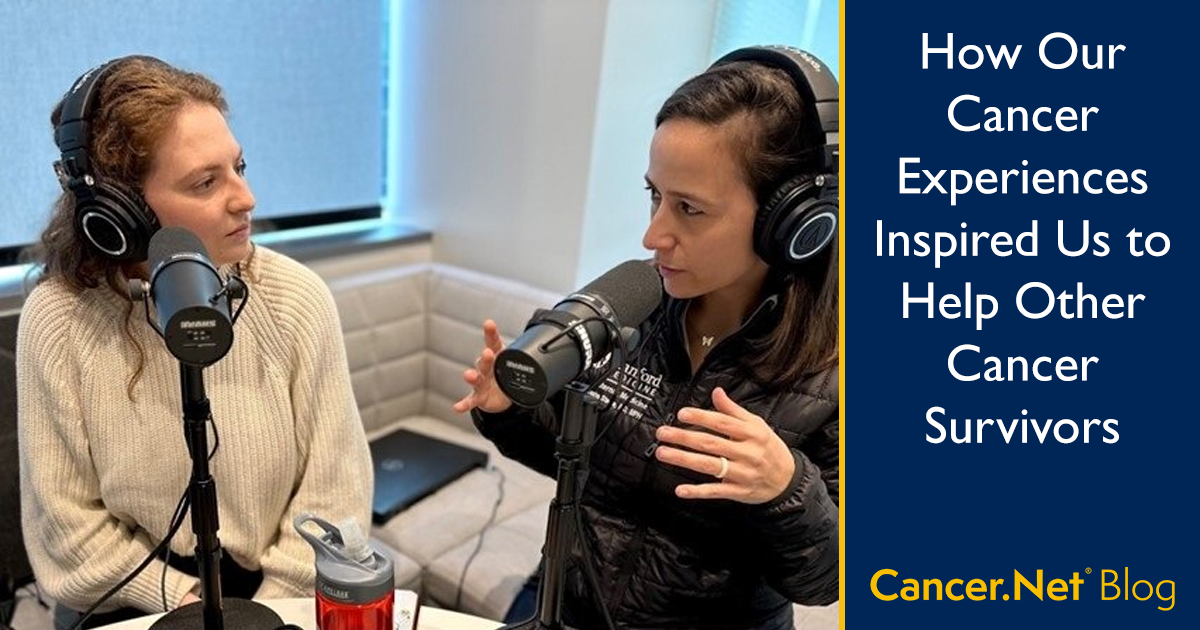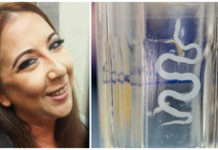
Voices on Cancer is an award-winning Cancer.Net Blog series where advocates share their stories and the lessons they have learned about being a cancer advocate. Natasha Steele, MD, MPH, has a background in clinical medicine, research, and health equity. She is a parent, a physician at Stanford Medicine, and a cancer survivor who is passionate about innovative strategies to rethink survivorship care. Elle Billman, BS, is a cancer survivor and a 2027 MD candidate at the Icahn School of Medicine at Mount Sinai. Her background as a childhood cancer survivor fuels her mission to advance survivorship care for current and future cancer survivors. You can follow Dr. Steele and Ms. Billman on X, formerly known as Twitter. View disclosure information for Dr. Steele. Ms. Billman has no relationships to disclose.
Our patient advocacy stories
Natasha’s story
I’m a mother, a doctor, and a cancer survivor. In fact, I pretty much became these 3 things in the same breath. My daughter was born the week I graduated from medical school, and I was diagnosed with lymphoma shortly after. The sudden combination of these events felt like riding a rollercoaster, but I was lucky to have a world-class medical team and the support of an incredible family. I was also fortunate to be given a diagnosis of no evidence of disease, or “NED,” at the end of my treatment.
However, once it was time to return to my “normal life,” I felt somewhat lost and uncertain about how to move forward. I had been so focused on the daily task of my own survival that remembering the basics of how to live suddenly felt challenging. I became a cancer survivorship advocate and researcher to understand the experience of cancer survivors and use my perspective as a physician and a patient to improve the status quo. And that’s when I met Elle!
Elle’s story
I’m a medical student and a cancer survivor. At the age of 3, I was diagnosed with leukemia. Being diagnosed with cancer at a young age meant that I couldn’t comprehend the gravity of my disease and was, therefore, shielded from it. While my parents waited anxiously for new blood cell count results, I learned how to ride my intravenous (IV) pole like a scooter down hospital hallways when I could muster the energy.
After 2 and a half years of treatment, I entered remission. I didn’t give my cancer history much attention until I started to experience late effects in high school. Learning how my cancer treatment could impact my health after being in remission for years launched me into the deep end of survivorship, where I realized how little I knew about my cancer history. I decided to take ownership of my survivorship by requesting my medical records and sorting through all 500 pages just to find my treatment regimen. The process I went through to uncover my cancer history motivated me to get involved in cancer survivorship research and advocacy. In doing so, I’ve connected with Natasha and the survivorship team at Stanford.
Using our experiences to help other cancer survivors
When we first met, we realized our lives and identities as cancer survivors were as similar as they were different. This reflects what we know about survivorship: it’s an incredibly diverse group of people of all different ages, genders, ethnicities, and cancer types. And yet, we were fast friends and quickly bonded over the similarities of our experiences.
In the earliest days of our friendship, we shared what we had learned from other cancer survivors and how much of this information was left out of visits with our medical teams. We knew intuitively there were common threads within survivorship and power in survivor voices, so we decided to figure out a way to create a sense of community, information, and empowerment for cancer survivors from all walks of life.
We were introduced to Drs. Lidia Schapira and Stephanie Smith, both pioneers in survivorship in the adult and pediatric cancer worlds, respectively. Lidia and Stephanie had experience creating a training course for primary care physicians on the needs of cancer survivors, and they were enthusiastic about working with us on a patient-facing version that would be co-created by survivors and medical experts.
We decided to conduct focus groups with survivors, held interviews, and participated in patient and family advisory committees to get firsthand perspectives from survivors themselves. What we heard was that survivors wanted some sort of trusted educational resource that they could access anywhere and at any time that was fun and free, like a podcast. They wanted a forum for hearing about all sorts of cancer stories: the challenges, the triumphs, the relationships impacted, the lessons learned, the lessons still to be learned, and where the field is headed. Finally, we learned the act of storytelling could be an engaging and meaningful form of communication for both the storyteller and the listener, and that humor was key.
Armed with this information, we decided to create a new podcast series called Health After Cancer that features a series of conversations with medical experts and cancer survivors across the age, gender, sexual identity, and cancer type spectrum.
Learning from other survivors
We couldn’t have anticipated the outpouring of energy, hope, and passion of the survivor stories that emerged with our podcast. We interviewed parents of survivors like Laura Lang-Ree, a “cancer mom” who found herself having to advocate for her kid to avoid toxicity of treatment. We heard from Michael Glover, a young oncologist and cancer survivor who shared his devastating story about male fertility and cancer treatments. We also heard from entrepreneur Hil Moss, a breast cancer survivor who talked about finding a new normal after treatment and starting a company to help other survivors.
Hearing the perspectives of these incredible individuals and so many others was such an inspiring and grounding thing to be a part of. It helped validate our own lived experiences and taught us both so much about the breadth of vantage points within the survivorship community. Most importantly, it normalized so much of what we were both going through and taught us new ways to think about these challenges.
If there’s one lesson we have both learned during survivorship it is that there is a beginning but no clear end to this experience, and how to sit with that reality. We’ve both found that doing things like being proactive about the details of our medical histories, staying on top of screening, investing in our mental health, and trying to keep our lifestyles as active and healthy as possible have been helpful ways to feel confident amidst the uncertainty of “cancer’s second act,” or life after cancer treatment. We hope our podcast reaches a wide audience and can help others feel a sense of empowerment and community in their own survivorship.





